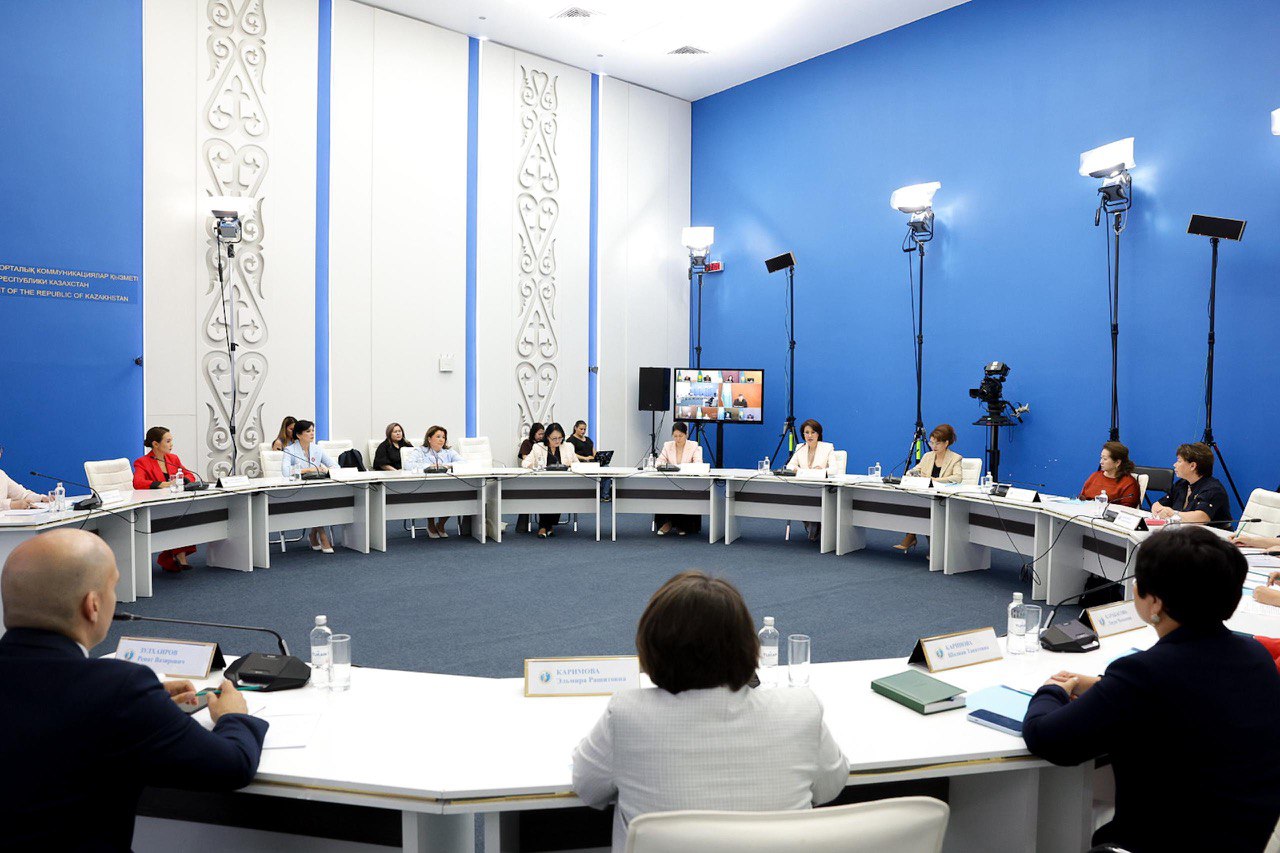Astana, June 20, 2025
A meeting of the National Commission on Women’s Affairs and Family and Demographic Policy under the President of the Republic of Kazakhstan was held at the Kazmedia Center conference hall. The session focused on preventing early pregnancies and promoting reproductive health among adolescents.
The meeting was opened by Chair of the National Commission, Minister of Culture and Information of the Republic of Kazakhstan Aida Balayeva. In her opening remarks, she emphasized the growing social importance of reproductive health education and the prevention of teenage pregnancies:
“Young people represent the intellectual, social, economic, and reproductive potential of our country. Experts from the Commission have noted with concern the low levels of awareness among adolescents and youth on sexual and reproductive health issues.”
The meeting was held with the participation of members of the newly appointed National Commission, in accordance with the Presidential Decree on the Commission’s rotation. Eight new members joined, representing civil society, academia, and public activism. Aiman Umarova, lawyer and member of the National Kurultai, was appointed as the new Deputy Chair.
The event also gathered representatives of central and local executive bodies, NGOs, and international organizations.
Minister of Healthcare Akmaral Alnazarova reported on the current situation:
“Despite ongoing efforts, the rates of teenage pregnancy and abortion remain high. The Ministry has adopted a Roadmap for 2023–2025 and a National Plan to enhance pediatric gynecological services, which include increasing access to contraceptives, staff training, and awareness campaigns.”
Chair of the Committee for Child Rights Protection Nasymzhan Ospanova presented the Ministry of Education’s efforts in reproductive and sexual health education. Deputy Chair of the Commission Zhuldyzai Iskakova reported on the results of the National Reproductive Health Week, highlighting the importance of educational campaigns to foster responsible attitudes among youth.
Aiman Umarova also emphasized the acute shortage of clinical psychologists — particularly in penitentiary institutions and when working with adolescent survivors of violence.Key Outcomes and Resolutions
Following the meeting, the following measures were adopted:
● Development of a new prevention strategy aimed at raising awareness among youth about the risks of early pregnancy and sexually transmitted infections, along with promoting a healthy lifestyle and reproductive well-being;
● Creation of a mobile app for teenagers and students to provide accessible and verified information on sexual and reproductive health;
● Regional outreach seminars in areas with high rates of teenage pregnancy, involving Commission members, local authorities, civil society, and parent associations;
● Audit of Youth Health Centers and resumption of dedicated adolescent health services;
● Preparation of media guidelines, in cooperation with the Ministry of Healthcare, to enhance how journalists cover teenage pregnancy issues;
● Review and scaling of the “Analar Saulygy” (Mothers’ Health) program, with updated recommendations for broader implementation.
Special attention was given to interagency cooperation at the regional level and to improving the performance of Family Support Centers, which play a key role in assisting vulnerable youth and preventing social risks.
A meeting of the National Commission on Women’s Affairs and Family and Demographic Policy under the President of the Republic of Kazakhstan was held at the Kazmedia Center conference hall. The session focused on preventing early pregnancies and promoting reproductive health among adolescents.
The meeting was opened by Chair of the National Commission, Minister of Culture and Information of the Republic of Kazakhstan Aida Balayeva. In her opening remarks, she emphasized the growing social importance of reproductive health education and the prevention of teenage pregnancies:
“Young people represent the intellectual, social, economic, and reproductive potential of our country. Experts from the Commission have noted with concern the low levels of awareness among adolescents and youth on sexual and reproductive health issues.”
The meeting was held with the participation of members of the newly appointed National Commission, in accordance with the Presidential Decree on the Commission’s rotation. Eight new members joined, representing civil society, academia, and public activism. Aiman Umarova, lawyer and member of the National Kurultai, was appointed as the new Deputy Chair.
The event also gathered representatives of central and local executive bodies, NGOs, and international organizations.
Minister of Healthcare Akmaral Alnazarova reported on the current situation:
“Despite ongoing efforts, the rates of teenage pregnancy and abortion remain high. The Ministry has adopted a Roadmap for 2023–2025 and a National Plan to enhance pediatric gynecological services, which include increasing access to contraceptives, staff training, and awareness campaigns.”
Chair of the Committee for Child Rights Protection Nasymzhan Ospanova presented the Ministry of Education’s efforts in reproductive and sexual health education. Deputy Chair of the Commission Zhuldyzai Iskakova reported on the results of the National Reproductive Health Week, highlighting the importance of educational campaigns to foster responsible attitudes among youth.
Aiman Umarova also emphasized the acute shortage of clinical psychologists — particularly in penitentiary institutions and when working with adolescent survivors of violence.Key Outcomes and Resolutions
Following the meeting, the following measures were adopted:
● Development of a new prevention strategy aimed at raising awareness among youth about the risks of early pregnancy and sexually transmitted infections, along with promoting a healthy lifestyle and reproductive well-being;
● Creation of a mobile app for teenagers and students to provide accessible and verified information on sexual and reproductive health;
● Regional outreach seminars in areas with high rates of teenage pregnancy, involving Commission members, local authorities, civil society, and parent associations;
● Audit of Youth Health Centers and resumption of dedicated adolescent health services;
● Preparation of media guidelines, in cooperation with the Ministry of Healthcare, to enhance how journalists cover teenage pregnancy issues;
● Review and scaling of the “Analar Saulygy” (Mothers’ Health) program, with updated recommendations for broader implementation.
Special attention was given to interagency cooperation at the regional level and to improving the performance of Family Support Centers, which play a key role in assisting vulnerable youth and preventing social risks.
